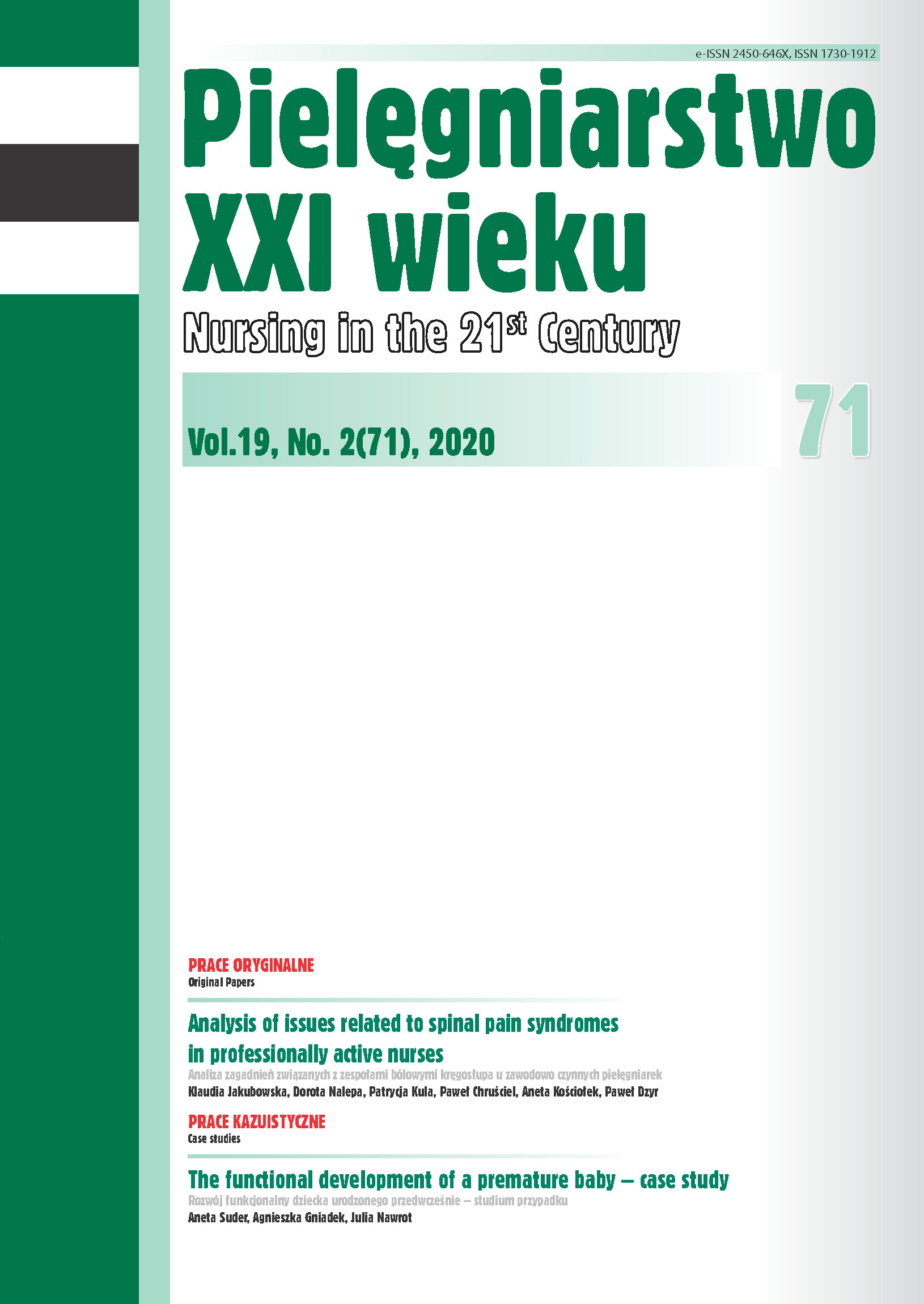Knowledge of nursing students about breast cancer prevention
DOI:
https://doi.org/10.2478/pielxxiw-2020-0012Keywords:
breast cancer, nursing students, prevention, knowledgeAbstract
KNOWLEDGE OF NURSING STUDENTS ABOUT BREAST CANCER PREVENTION
Introduction. Breast cancer has been one of the biggest oncological problems both in Poland and around the world. In 2014, a total of 17,379 new cases of this disease were diagnosed in Poland, which constitutes 22% of all cancer types in women. A growing number of women suffering from this type of cancer poses a challenge for the future nurses who should have enough knowledge to professionally plan and implement high quality care to their patients.
Aim. To investigate whether nursing students have knowledge about breast cancer prevention.
Methods. The study was conducted in 2019 and included 166 nursing students from the Medical University of Warsaw. The diagnostic survey method was used to collect data, and with the author’s consent, a survey developed by dr Jolanta Sielska was used.
Results. Over a half of the respondents (67.58%) knew correct answers regarding the principles of breast cancer prevention. Out of maximum of 22 points, students in average scored a total of 14.87 points, indicating a good level of knowledge regarding this issue. The majority of students (96.39%) claimed they knew the principles of breast self-examination. One fourth of the respondents (26.51%) rated their knowledge in the field of breast cancer prevention as 7 on a scale from 1 to 10. There was no correlation between students’ self-assessment of their knowledge and the actual level of knowledge regarding this topic.
Conclusions. Nursing students from the Medical University of Warsaw generally have good knowledge about breast cancer prevention. This suggests that they are prepared to educate their future patients during professional work.
References
1. Budny A, Starosławska E, Budny B, i wsp. Epidemiologia oraz diagnostyka raka piersi. Polski Merkuriusz Lekarski. 2019;46(275): 195-204.
2. Jassem J, Krzakowski M, Bobek-Billewicz B, et al. Breast cancer. Oncol Clin Pract. 2018;14(4): 171-215.
3. Bojakowska U, Kalinowski P, Kowalska ME. Epidemiologia i profilaktyka raka piersi. Journal of Education, Health and Sport. 2016;6(8): 701-710.
4. Didkowska J, Wojciechowska U. Nowotwory piersi w Polsce i Europie – populacyjny punkt widzenia. Nowotwory. Journal of Oncology. 2013;63(2): 111-118.
5. Szekiela M, Worach-Kardas H, Marcinkowski J. Nowotwór złośliwy piersi – epidemiologia, czynniki ryzyka, znaczenie profilaktyki pierwotnej i wtórnej. Problemy Higieny i Epidemiologii. 2014;95(2): 292-302.
6. Tkaczuk-Wałach J, Sobsty M, Jakiel G. Rak piersi – znacznie profilaktyki pierwotnej i wtórnej. Przegląd Menopauzalny. 2012; 4: 343-347.
7. Sowa M, Smuczyński W, Tarkowski M, i wsp. Analiza wybranych czynników ryzyka raka piersi – przegląd piśmiennictwa. Journal of Education, Health and Sport. 2015;5(4): 245-250.
8. Tomaszek L, Dębska G, Kotyza M. Poziom wiedzy studentek kierunku pielęgniarstwo na temat czynników ryzyka i profilaktyki raka piersi. Państwo i Społeczeństwo. 2015;15(3): 38-49.
9. Szadowska-Szlachetka Z, Baczewska B, Kulbaka Z, i wsp. Wiedza kobiet, studentek pielęgniarstwa, na temat profilaktyki raka piersi. Journal of Education, Health and Sport. 2016;6(12): 504-519.
10. Jędrzejewska M, Węckowski B, Jankowski P. Wiedza pacjentek i personelu medycznego na temat raka gruczołu piersiowego w określonej grupie wiekowej. Inżynier i Fizyk Medyczny. 2015;4(1): 18-22.
11. Sujindra E, Elamurugan TP. Knowledge, attitude, and practice of breast self-examination in female nursing students. Int J Educ Psychol Res. 2015;1(2): 71-74.
12. Sapountzi-Krepia D, Rekleiti M, Psychogiou M, et al. Evaluating female nursing students’ knowledge and attitudes regarding breast self-examination. Health Care for Women International. 2017;38(8): 786-795.
13. Sielska J. Diagnoza zachowań prozdrowotnych w aspekcie profilaktyki raka piersi u kobiet zdrowych (nieopublikowana rozprawa doktorska) 2012. Poznań: Uniwersytet Medyczny im. Karola Marcinowskiego w Poznaniu
14. Piaszczyk D, Ignaciuk S, Kosińska B, Karczewski J. Poziom wiedzy studentów Państwowej Szkoły Wyższej w Białej Podlaskiej na temat profilaktyki raka piersi. Medycyna Ogólna i Nauki o Zdrowiu. 2015;21(3): 260-265.
15. Piersa W, Kułak P, Dmitriuk E, i wsp. Metody diagnostyki obrazowej zmian w piersiach u kobiet w percepcji studentów. Medycyna Paliatywna. 2018;10(2): 71- 79.
16. Wołowski T, Wróblewska P. Ocena wiedzy gdańskich studentek na temat profilaktyki raka piersi. Problemy Higieny i Epidemiologii. 2012;93(2): 347-349.
17. Cipora E. Prevention of breast cancer – the importance of screening test. Journal of Education, Health and Sport. 2017;7(8): 1733-1749.
18. Garwacka-Czachor E, Maciejczyk A, Bębenek M. Breast self-exams in a group of women participating in mammography screening. Nowotwory J Oncol. 2016;66: 445-449.
19. Ridan T, Berwecki A, Anna Spannbauer, i wsp. Ocena wiedzy i postaw studentów na temat profilaktyki raka piersi i mastektomii. Doniesienie wstępne. Cywilizacyjne zagrożenia człowieka. Wyzywania dla edukacji i profilaktyki. 2016; s.146-148.
20. Melnyk B. M. Educational programming in undergraduate and graduate academic curricula: Friend or foe to accelerating evidence-based practice? Worldviews on Evidence-Based Nursing. 2013;10(4): 185-186.
Downloads
Published
Issue
Section
License
Copyright (c) 2020 Authors

This work is licensed under a Creative Commons Attribution-NonCommercial-NoDerivatives 3.0 Unported License.




